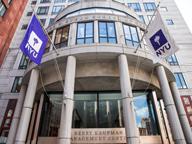School News
—
Executive Director of the Office of Student Engagement Bryan Ramos podcast interview, highlighting Stern Solutions experiential learning courses and projects: “Experiential Learning at NYU Stern.”
—

Excerpt from MBA Schooled -- “Bryan Ramos is the Executive Director in the Office of Student Engagement at NYU Stern. As part of his role he’s responsible for overseeing Stern’s Experiential Learning programs, branded Stern Solutions, for MBA students. During our conversation, we spoke about the importance of experiential learning in higher education, and how Stern has created a new model and unique set of offerings for MBA students that engages them in an iterative process of immersion, acting and reflecting.”
School News
—

Excerpt from MBA Schooled -- “Bryan Ramos is the Executive Director in the Office of Student Engagement at NYU Stern. As part of his role he’s responsible for overseeing Stern’s Experiential Learning programs, branded Stern Solutions, for MBA students. During our conversation, we spoke about the importance of experiential learning in higher education, and how Stern has created a new model and unique set of offerings for MBA students that engages them in an iterative process of immersion, acting and reflecting.”













